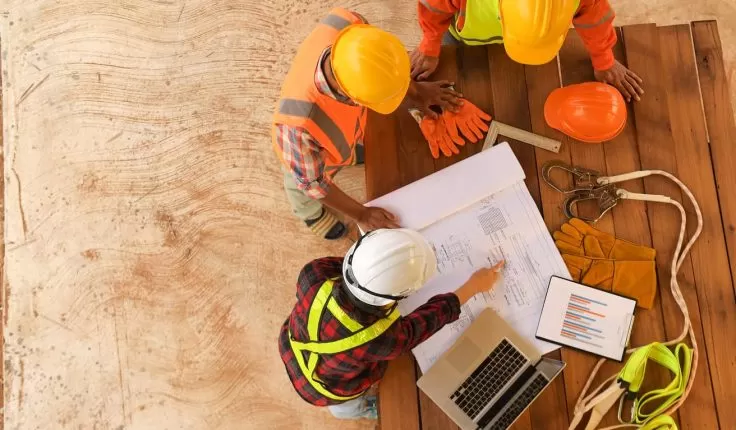How do Building Inspectors Ensure Safety in Construction Projects?
0 Views

The construction industry is a vital component of economic growth and infrastructure development. Whether it’s a towering skyscraper or a small commercial space, the safety and quality of these structures are paramount. Building inspectors play a crucial role in ensuring the safety and compliance of construction projects. In this article, we will delve into the world of building inspectors, their responsibilities, and how they ensure safety in commercial building projects.
The Role of Building Inspectors
Building inspectors are unsung heroes of the construction industry. They are responsible for assessing the compliance of construction projects with local building codes, zoning regulations, and safety standards. Their primary objective is to safeguard public safety and ensure that buildings are constructed in a way that minimizes risks to occupants, the community, and the environment.
Key Responsibilities of Building Inspectors:
- Plan Review: Building inspectors begin their work before construction even commences. They review construction plans to ensure they meet all code and regulation requirements. This proactive step helps prevent potential issues during the construction process.
- Inspection of Construction Sites: Building inspectors visit construction sites regularly to assess the work in progress. They check for proper building techniques, material quality, and adherence to safety standards. These on-site inspections are crucial to identifying and rectifying any non-compliance issues promptly.
- Code Compliance: Ensuring that structures meet local building codes and regulations is a fundamental responsibility. These codes cover various aspects, including structural integrity, fire safety, electrical systems, plumbing, and accessibility for people with disabilities.
- Zoning Regulations: Building inspectors also evaluate compliance with zoning regulations. They check whether the construction project adheres to zoning laws related to land use, setbacks, and property boundaries.
- Safety Standards: Safety is a top priority. Building inspectors confirm that the construction site is safe for workers and the public. They review safety measures, such as the installation of guardrails, safety netting, and the proper use of personal protective equipment.
The Process of Commercial Building Inspection
Commercial building inspection is a meticulous process that can be broken down into various stages:
- Pre-Construction Inspection: Before construction begins, building inspectors review construction plans to ensure they meet all the necessary regulations. This stage helps prevent issues that might arise later in the construction process.
- Foundation Inspection: The foundation is the backbone of any structure. Building inspectors check the foundation’s depth, width, and the quality of materials used. They also ensure proper drainage to prevent water damage.
- Framing Inspection: This step involves examining the framework of the building, including walls, floors, and roofs. Building inspectors confirm that the structural components meet safety standards and that the framing is properly anchored.
- Electrical and Plumbing Inspection: Inspectors assess electrical and plumbing systems to ensure they are installed safely and comply with codes. This is crucial for preventing electrical hazards and plumbing leaks.
- Fire Safety Inspection: Building inspectors check fire protection systems, such as fire alarms, sprinklers, and emergency exits, to ensure they are in good working order.
- Final Inspection: Once the construction is completed, a final inspection is conducted to verify that the building meets all codes and regulations. This is the last opportunity to identify and rectify any issues before the building is occupied.
Ensuring Safety in Commercial Building Projects
The primary goal of building inspectors is to ensure the safety of commercial building projects. They achieve this by:
- Mitigating Risks: Building inspectors identify potential risks and issues during construction, allowing them to be addressed promptly. This proactive approach minimizes the likelihood of accidents and costly repairs down the road.
- Compliance with Codes: Ensuring that buildings adhere to local building codes and regulations is essential for safety. These codes are designed to protect occupants and the surrounding community.
- Quality Control: Building inspectors assess the quality of construction materials and workmanship. High-quality materials and proper construction techniques are key to a building’s longevity and safety.
- Environmental Concerns: Inspectors also look for environmental compliance, such as proper disposal of hazardous materials and adherence to environmental regulations.
- Community Safety: Commercial buildings are often situated in densely populated areas. Ensuring their safety is not only a matter of protecting the occupants but also the neighboring community.
Challenges Faced by Building Inspectors
Building inspectors face several challenges in their mission to ensure safety in construction projects. These challenges include:
- Evolving Codes and Regulations: Building codes are regularly updated to reflect new safety standards and technologies. Keeping up with these changes is a constant challenge for inspectors.
- Varied Construction Practices: The construction industry is diverse, and inspectors must adapt to a wide range of building methods and materials.
- Workload and Time Constraints: Inspectors often have tight schedules, with multiple projects to oversee simultaneously. This can lead to time constraints and potential oversight.
Conclusion
Building inspectors are the silent guardians of commercial building projects, diligently working to ensure the safety, quality, and compliance of structures. Their comprehensive inspections and commitment to enforcing building codes and regulations help prevent accidents, protect communities, and guarantee the longevity of commercial buildings. The role of building inspectors in commercial building inspection is vital in ensuring that the foundations of our cities are safe, secure, and resilient.
- TAGS :
- Building Inspectors
Related Posts
How Do You Choose the Right Angle Bar Size and Material for Your Project?
Andrin Andrin / July 18, 2024











